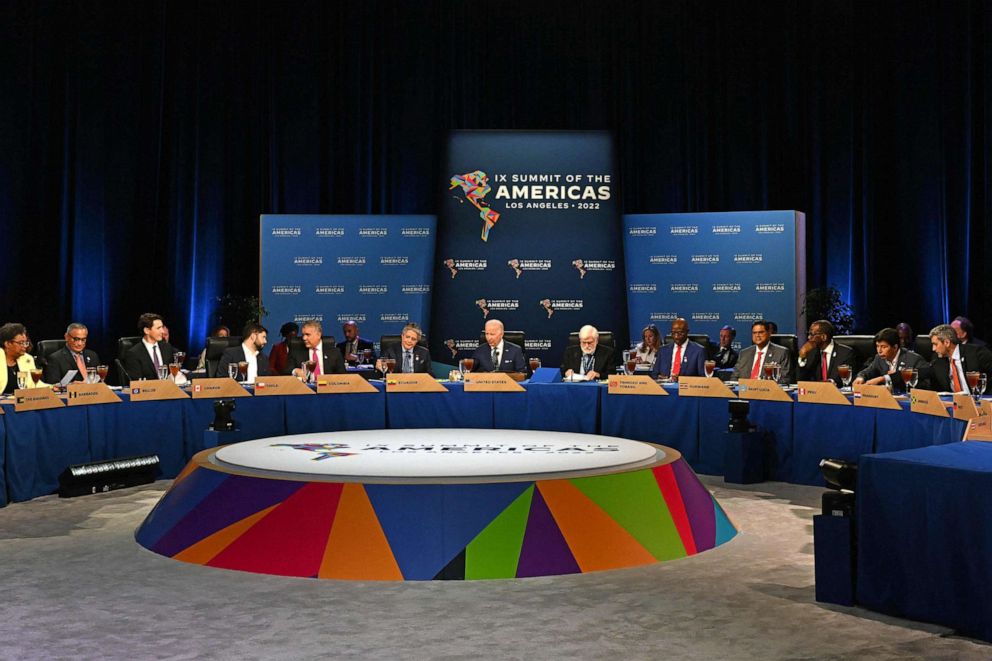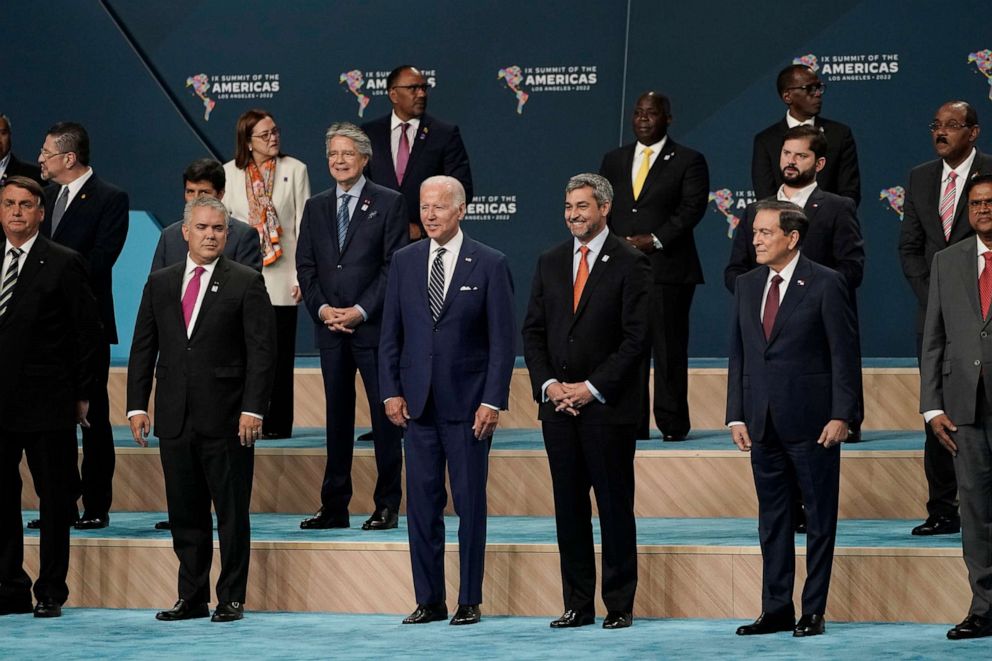Biden announces joint declaration on immigration in attempt to show unity across the Americas
20 different countries have signed on to the declaration.
Flanked by the leaders of several countries, President Joe Biden announced the Los Angeles Declaration of Migration and Protection on the final day of the Summit of the Americas on Friday.
20 different countries signed on to the declaration, each committing to tackling different components of migration.
Biden credited the pandemic, Russia’s invasion of Ukraine, and climate change as contributing factors to migration throughout the Western Hemisphere.
“Right now, migrants make up as much as 10% of the population of Costa Rica. And no nation should bear this responsibility alone, in my view, our view,” he said.
Many of the commitments under the declaration deal specifically with boosting temporary worker programs.

Canada has agreed to welcome more than 50,000 agricultural workers from Mexico, Guatemala, and the Caribbean this year. Mexico and Guatemala are also agreeing to expand migrant labor programs to address labor shortages.
Ecuador has issued a decree to create a pathway to regular migration status for Venezuelans who legally entered through port of entry but are currently unlawfully in the country.
At home, the Biden Administration has offered its own commitments including $300 million in funding for humanitarian assistance for countries “so when migrants arrive on their doorstep, they can provide a place to stay, make sure migrants can see a doctor, find opportunities to work, so they don't have to undertake the dangerous journey north.”
The Biden Administration has been rattled by the continuation of hardline immigration policies installed by the Trump administration.
Unprecedented rates of migration and piecemeal approaches to stemming the flow have manifested in large groups gathering at ports of entry like Del Rio, Texas. However today, the president made clear that controlling migration is a responsibility shared among all nations in the western hemisphere. Perhaps pushing back on Republican attacks that he’s “soft on immigration,” the president also assured that the declaration includes a commitment to strengthen border security as well as the administration’s intention to expand a multilateral “sting operation” that aims to disrupt human trafficking in Latin America.
“If you prey on desperate and vulnerable migrants for profit, we are coming for you. We are coming after you," Biden said.
The U.S. Department of Agriculture will be launching a $65 million pilot program to issue grants for farmers hiring seasonal agricultural workers.
The administration failed in its attempts to lift Title 42, a Trump-era policy that allows the government to quickly expel migrants without giving them a chance to apply for asylum because of the ongoing pandemic. Last month, a federal judge prevented the administration from ending the rule on May 23.
Immigration advocates and lawyers have said that Black asylum seekers are bearing the brunt of these kinds of hardline policies as they face discrimination at our border and on their journey here.
In September, photos depicting Border Patrol agents on horse back aggressively apprehending Haitian migrants in Del Rio, Texasy, sparked outrage and a lawsuit on behalf of some of the people detained that day.
The president has carved out several initiatives that deal specifically with Haitian migrants in the Declaration including resuming its participation in the Haitian Family Reunification Parole Program, which allows U.S. citizens and lawful permanent residents to apply for parole for relatives in Haiti. The U.S. will also be providing 11,500 H-2B visas for nonagricultural seasonal workers from Central America and Haiti.

Nana Gyamfi, the Executive Director of Black Alliance for Just Immigration (BAJI), said the initiatives laid out in the declaration deprive Haitian migrants the right to seek asylum where they feel safe.
“When you claim asylum, you are taking agency over your life. You are saying that I'm making this journey, if I survive here is where I want to be safe,” she said. “All of the pieces that you see in this declaration are all take away agency from the people who need the support, and puts all of the decision making into government entities.”
Gyamfi also believes it fails to address institutional racism that excludes Black asylum seekers from finding refuge across the hemisphere.
“There's no policies that are saying look, we understand that you know, anti Blackness exists and that it's being expressed not just in the United States policy, but the policies of Mexico and the policies in Central America,” she said.
The announcement of the Declaration comes as some of the controversy over notable absences at the Summit have threatened to overshadow the collaborative work the administration intended to do on issues like climate change, recovery from the COVID-19 Pandemic, and migration.
Mexican President Andres Manuel Lopez Obrador and Guatemalan President Alejandro Giammattei boycotted the summit over the administration’s decision to not invite leaders of the authoritarian governments of Venezuela, Nicaragua, and Cuba.
During a plenary session, Prime Minister of Belize Johnny Briceño slammed the president, as he was seated from a few feet away, over his “incomprehensible” and “un-American” exclusion of Cuba and Venezuela.
The administration is touting the declaration as proof that countries in the region can work together to achieve common goals.
Belize has committed to launching a program in August to legalize some Central American and CARICOM migrants who have been living illegally in the country.
“Our security is linked in ways that I don't think most people in my country fully understand, and maybe not in your countries as well. Our common humanity demands that we care for our neighbors by working together,” the president said.




